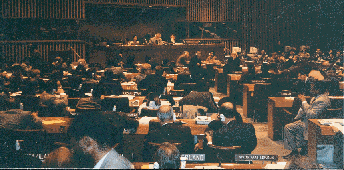THE 'PREHISTORY' OF Social
Watch
3 - The Context and Objectives of
the Social Summit
The Social Summit fell within a series
of UN World conferences which all addressed different aspects
of development, including the environmental, human rights,
population, and gender equality. The scope for the Social
Summit emerged from work of the Special Representative of
the Secretary-General, Juan Somavía, to hold comprehensive
consultations with Member States on the World Summit for Social
Development. Ambassador Somavía became Chile's representative
to the UN following his return from exile in Mexico after
the Pinochet dictatorship was sidelined in 1990.
In the analysis of Somavía the
UN was entering into an 'identity crisis' after the fall of
the Berlin Wall. The significance of the UN during the Cold
War in politically guiding international relations through
the Security Council was dramatically diminishing. Other multilateral
institutions, such as the International Monetary Fund, the
World Bank and the GATT - the predecessor of the World Trade
Organisation (WTO) - had become important instruments for
international co-operation, particularly since the inclusion
of Eastern Europe in its membership. Consequentially the UN's
role in international security issues declined, and its tasks
in social and economic policy areas were seriously curtailed
as well.6
Somavía believed that the UN
should win back its mandate in social and economic areas and
that 'development' should be put higher at the political agenda.
In the United Nations Programme for Development (UNDP) he
found an ally. This UN body launched a comeback in 1990 with
the 'Human Development Report'. In this annual publication
development was measured in terms of human development, as
opposed to the limited traditional economic approach of the
Bretton Woods Institutions. It was UNDP's attempt to win back
political space by creating a vision that challenged the predominant
approach, an approach criticised by an increasing number of
developing countries.
UNDP also put their thinking for new
initiatives strongly in the context created by the end of
the Cold War. It was among others an attempt to give new meaning
to the concept of 'security', a human centred idea of security.
The chief editor of the Human Development Report at the time,
Pakistani Mahbud Ul Haq, wrote during the first Preparatory
Committee of the Social Summit:
"This is a time when the unthinkable
is becoming commonplace - from the handshakes of Yasser Arafat
and Yitzhak Rabin to the joint Nobel prize for Nelson Mandela
and F.W. de Klerk to the close collaboration between the United
States and Russia. (..) We stand at a point in history when
the very concept of security may be changing."7
In Ul Haq's view the Social Summit
should provide concrete substance to the emerging concept
of 'human security' developed by UNDP's Human Development
Report. In the 1993 Report to the Preparatory Committee Chairman
Somavía, elected at its first meeting, introduced it:
"At the heart of the Summit [is]
the major issue of human security."8
Somavía saw the 1990 children's
Summit as an example of how the political agenda of the UN
could be moved. Choosing the right name for the Summit was
a challenging question when the idea first emerged in 1991.
A 'human development summit' would be too closely associated
with UNDP. A 'sustainable development summit' would not distinguish
sufficiently from the United Nations Development and Environment
Conference (UNCED). An 'economic development summit' was likely
to be too offensive vis à vis the Bretton Woods institutions.
The term 'social development' was politically the most neutral
term.
The nature of the meeting being a Summit
was justified later by UN General Secretary Boutros Ghali
to be necessary as:
"Social development goes far wider
than the mandate of social ministries. It lies at the heart
of economic development, of human rights and of peace and
security. This is why we must raise the political level at
which social issues are discussed, both nationally and internationally."9

When the proposal was launched during
the United Nations General Assembly in 1992 there was more
interest than had perhaps originally been anticipated. Clinton
had just won the Presidential elections. US diplomats were
lobbied to give up their opposition in view of the new situation.
It was argued that Clinton, who was elected with a social
agenda, could not possibly be against the Summit, which would
be held during his period as President. After negotiations
with the Clinton-team the diplomats of Bush voted in favour
of resolution 47/92 of 16th December 1992 in which the United
Nations decided to convene a World Summit for Social Development
(see annex 1).10
|